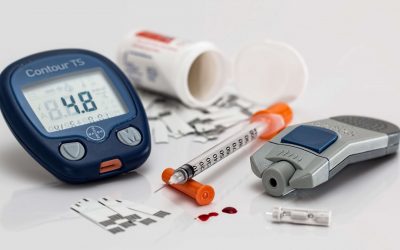High-fat,low-carbohydrate diets may be best for people with diabetes

by DiabetesCare.net | Dec 26, 2022
High-fat, low-carbohydrate diets may be best for people with diabetes, according to a small Linköping University study. Researchers enlisted 61 adults with type 2 diabetes who were randomly assigned to eat either a high-carb diet composed of 50 percent to 60 percent carbohydrates, 30 percent fat, and 10 percent to 15 percent protein, or a high-fat diet...
Replacing sugar-sweetened beverages or juice with water.

by DiabetesCare.net | Dec 26, 2022
Replacing sugar-sweetened beverages or juice with water is associated with a slightly lower risk of type 2 diabetes, according to a recent University of North Carolina (UNC) study. The large, long-term study followed more than 80,000 women for over a decade and found a 10 percent higher risk of developing diabetes for each cup of sugar-sweetened drink or...
Edible `Stop Signs` in Food Could Help Control Overeating

by DiabetesCare.net | Jun 8, 2012
Higher levels of certain blood proteins may protect people from developing type 2 diabetes, according to a recent Yeshiva University study. The proteins, IGF-1, IGFBP-1, IGFBP-2 and IGFBP-3, are part of the insulin-like growth factor (IGF) axis, so named because they influence blood sugar levels and cell growth. In the study, blood from 742 women who...
Type 2 Diabetes Raises Adenoma Risk in Those 40 to 49 Years of Age

by DiabetesCare.net | Jun 8, 2012
Eating a variety of fruits and vegetables can help decrease the risk of type 2 diabetes, according to a new Institute of Metabolic Science study. The study followed more than 3,700 adults for 11 years and found that those who ate the most fruits and vegetables each week had a lower risk of developing type 2 diabetes than those who ate the fewest. Those who...
PCB Can Increase Risk of Abdominal Fat

by DiabetesCare.net | Jun 8, 2012
Magnesium helps maintain muscles and nerves, regulate blood sugar and blood pressure, and prevent heart attacks, according to National Institutes of Health (NIH) studies. Magnesium found in seaweed, wheat bran, avocados, spinach, beans, peas, almonds, cashews, and in supplements, also can help calm muscle spasms. Yet, nearly 80 percent of people in the...
 High-fat, low-carbohydrate diets may be best for people with diabetes, according to a small Linköping University study. Researchers enlisted 61 adults with type 2 diabetes who were randomly assigned to eat either a high-carb diet composed of 50 percent to 60 percent carbohydrates, 30 percent fat, and 10 percent to 15 percent protein, or a high-fat diet...
High-fat, low-carbohydrate diets may be best for people with diabetes, according to a small Linköping University study. Researchers enlisted 61 adults with type 2 diabetes who were randomly assigned to eat either a high-carb diet composed of 50 percent to 60 percent carbohydrates, 30 percent fat, and 10 percent to 15 percent protein, or a high-fat diet...



